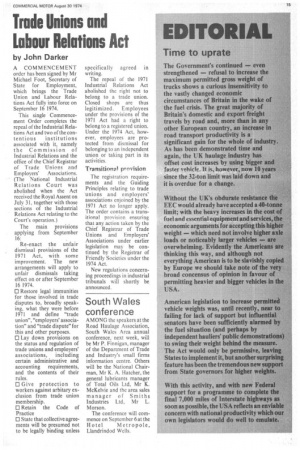Trade Unions and Labour Relations Act
Page 17

If you've noticed an error in this article please click here to report it so we can fix it.
by John Darker
A COMMENCEMENT order has been signed by Mr Michael Foot, Secretary of State for Employment, which brings the Trade Union and Labour Relations Act fully into force on September 16 1974.
This single Commencement Order completes the repeal of the Industrial Relations Act and two of the con tentious institutions associated with it, namely the Commission of Industrial Relations and the office of the Chief Registrar of Trade Unions and Employers' Associations. (The National Industrial Relations Court was abolished when the Act received the Royal Assent on July 31. together with those sections of the Industrial Relations Act relating to the Court's operation.) The main provisions applying from September 16: Re-enact the unfair dismissal provisions of the 1971 Act, with some improvement. The new arrangements will apply to unfair dismissals taking effect on or after September 16 1974.
0 Restore legal immunities for those involved in trade disputes to, broadly speaking, what they were before 1971 and define "trade union", "employers' association" and "trade dispute" for this and other purposes. 0 Lay down provisions on the status and regulation of trade unions and employers' associations, including certain administrative and accounting requirements, and the contents of their rules.
ID Give protection to workers against arbitary exclusion from trade union membership.
0 Retain the Code of Practice 0 State that collective agreements will be presumed not to be legally binding unless specifically agreed in writing.
The repeal of the 1971 Industrial Relations Act abolished the right not to belong to a trade union. Closed shops are thus legitimized. Employees under the provisions of the 1971 Act had a right to belong to a registered union. Under the 1974 Act, however, employees are protected from dismissal for belonging to an independent union or taking part in its activities.
Transition& provision
The registration requirements and the Guiding Principles relating to trade unions and employers' associations enjoined by the 1971 Act no longer apply. The order contains a transitional provision ensuring that any action taken by the Chief Registrar of Trade Unions and Employers' Associations under earlier legislation may be continued by the Registrar of Friendly Societies under the 1974 Act.
New regulations concerning proceedings in industrial tribunals will shortly be announced.




































































































